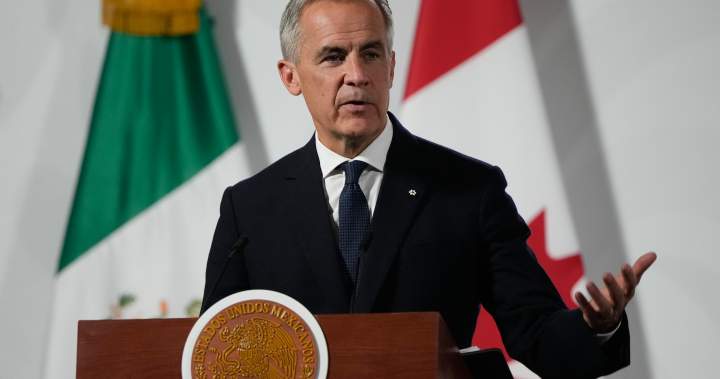Prime Minister Mark Carney on Thursday acknowledged the issue of Mexican drug cartels operating in Canada, but also that “there are Canadian gangs that operate in Mexico” and that more cooperation is needed to combat them.
Carney made the comments while speaking alongside Mexican President Claudia Sheinbaum in Mexico City, where the two leaders signed a new comprehensive strategic partnership aimed at strengthening trade and security ties, including tackling transnational organized crime.
“The unfortunate fact is that yes, there are cartels or gangs from one country in another country, but also vice versa,” he told reporters. “I’m going to acknowledge that there are Canadian gangs that operate in Mexico. We cooperate with the Mexican authorities. We share information. We’re deepening that cooperation.
“Surveillance, heightened police cooperation is appropriate in order to ensure that these criminals are brought to justice, and not wavering in the efforts to bring them to justice, whether the activities are in Canada, Mexico or the United States.”
Sheinbaum noted the partnership agreement signed Thursday focuses on “collaboration and cooperation” on border security, but also issues like cybersecurity and defence.
Canada and Mexico are both facing U.S. tariffs on non-free trade goods, which U.S. President Donald Trump has justified with concerns over cross-border fentanyl trafficking.

A memorandum signed by Trump and issued Wednesday noted that, while Canada has taken actions to combat fentanyl, “more action is needed to stop fentanyl and other drugs from crossing our border and to arrest drug criminals exploiting Canadian territory.”

Get daily National news
Get the day’s top news, political, economic, and current affairs headlines, delivered to your inbox once a day.
Canada was not listed among the countries the U.S. has deemed “major drug transit or major illicit drug producing countries,” but Mexico, China and several Latin American countries are.
There have been growing examples of transnational drug and organized crime activity in both Canada and Mexico in recent years.
Ryan Wedding, a Canadian former Olympic snowboarder accused of running a transnational drug trafficking network in Mexico and Canada, is currently on the FBI’s 10 most wanted fugitives list.
A report from the U.S. Drug Enforcement Agency in May warned fentanyl “super laboratories” in Canada are “a growing concern for the United States,” particularly as production and supply from Mexico is disrupted by more aggressive actions spurred by Trump’s tariffs.
The annual Drug Threat Assessment said that while the flow of fentanyl from Canada into the U.S. is far lower than from Mexico, Canadian opioid production has the potential to expand and fill the “supply void” from south of the U.S. border.
A recent Criminal Intelligence Service Canada report said organized crime groups involved in manufacturing fentanyl, operating mostly in British Columbia and Ontario, are actively engaged with Latin American drug cartels.
While the report found involvement in fentanyl has increased by 42 per cent since 2019, it added those groups are also linked with American criminal organizations to traffic firearms into Canada.
Earlier this year, Canada followed the U.S. in declaring several Mexican cartels as foreign terrorist organizations.
Jody Thomas, who served as national security advisor to former prime minister Justin Trudeau, told Global News at the time that organized crime cartel activity in Canada is “very prevalent now” compared to at least a decade ago and expressed hope the terrorist designation would help.
“It’s becoming a problem and we have an opportunity here to get a grip on it before it becomes a national crisis,” she said.

Canadian law enforcement has cracked down on fentanyl producers in the country in recent months, including three drug labs that were taken down in British Columbia’s Lower Mainland this past spring.
Another drug “superlab” in British Columbia busted in October 2024 served as a “supermarket” for organized crime,” according to authorities, producing and distributing fentanyl and methamphetamine across Canada and internationally.
The Liberal government has tabled legislation that aims to give law enforcement sweeping new powers to crack down on fentanyl trafficking, including enhanced surveillance authority and the ability to search Canada Post mail.
The latest U.S. Customs and Border Protection data shows that fentanyl seizures at the northern border have fallen back to near-record lows, with just 0.2 kilograms seized in July, after a two-month spike of over 26 kilograms seized in April and May.
However, overall drug seizures soared in July, driven primarily by an increase in encounters of what the CBP classifies as “other drugs” — a classification that includes oxycodone and other prescription and illicit opioids, as well as precursor chemicals.
The data also shows seizures at the southern U.S. border have fallen from last year.
© 2025 Global News, a division of Corus Entertainment Inc.
Carney says Mexican gangs operating in Canada ‘and vice versa,’ vows action





